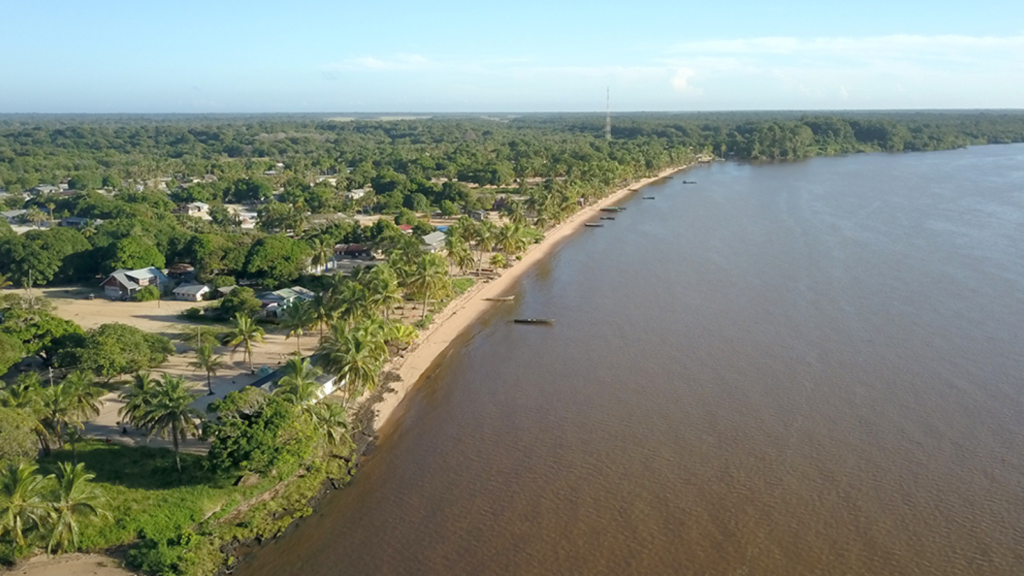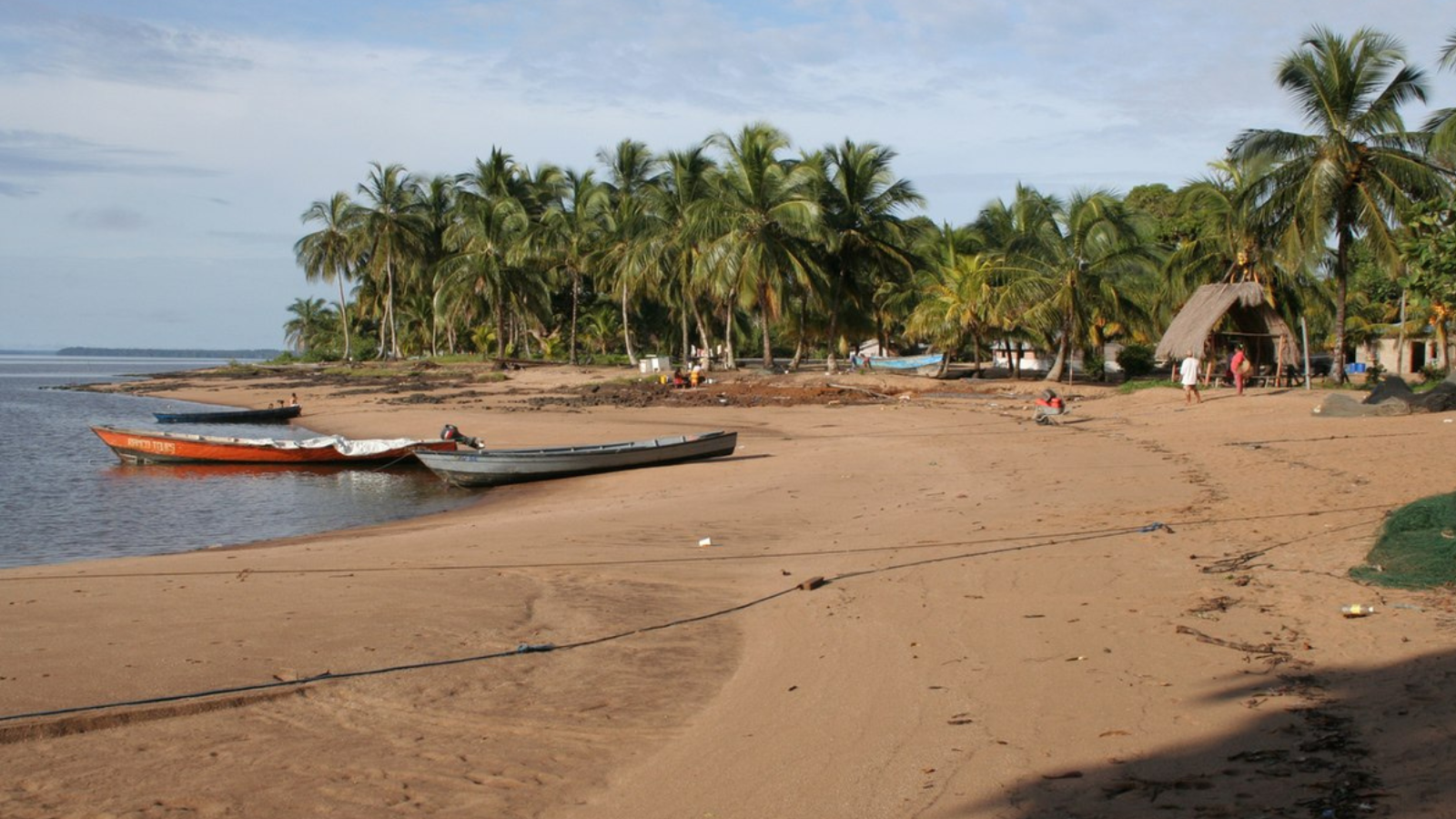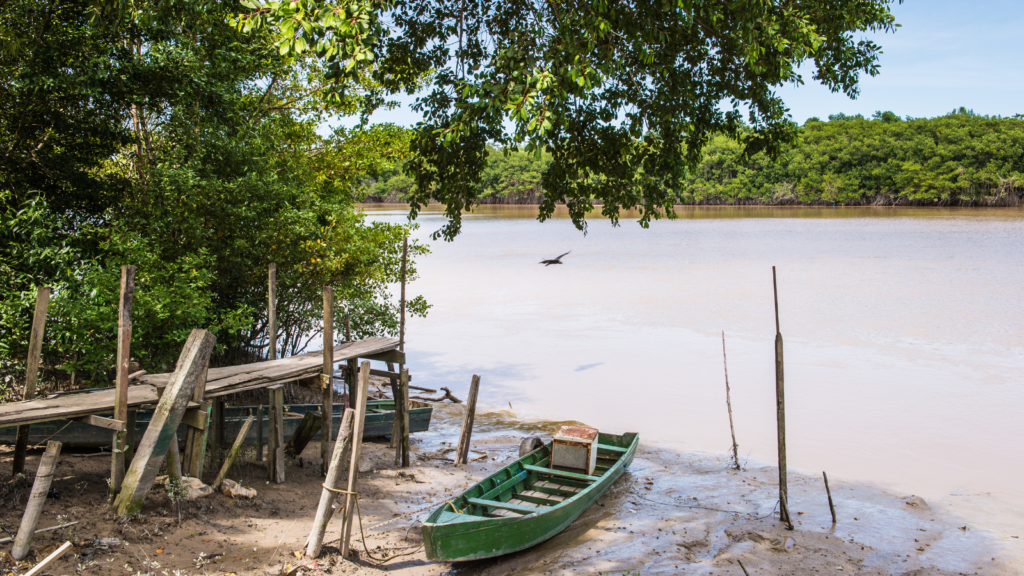The Kaliña, a nation of Suriname’s Indigenous People, has been living in harmony with nature for many decades. However, in recent years, they have been forced to adapt to abnormal changes that have disrupted their existence.
Rising sea levels have had dire consequences on their village – Galibi – located in the Marowijne District, two hours away from Suriname’s capital, Paramaribo. The village economy was crippled when their community-operated guest house, which employed many residents, was destroyed by the relentless force of the sea.
Sirito Yana Aloema, an Indigenous leader and a native of Galibi Village, says the guest house was destroyed by the effects of climate change.
“We had a guest house (Eco-Lodge) that was providing work for a lot of people in the community. This guest house was just getting washed out because of the climate change. The sea level is increasing and it took the whole guest house away.”

Sea level rise erodes eco-tourism
His coastal community, home to one of Suriname’s pristine natural beaches along the country’s East and Northeast coast, has significantly changed due to rising sea levels that erode the foreshore, where his community has resided for decades.
Over 20,000 or 3.8% of the population in Suriname are indigenous people The Kaliña are among the largest indigenous groups in the country.
Sirito, who is the President of Suriname’s Indigenous Peoples Organisation said, this harsh change has had a detrimental impact on their traditional way of life. As climate change impacts have intensified before their eyes, the Kaliñas residing at Galibi are left to grapple with constant alterations of their environment such as rapid erosion and abnormally high tides, among others, and threats to their way of life and heritage.
During the operation of the Eco Lodge Guest House, the community catered to the needs of 100 persons and several persons from the village gained employment. The income supported the community’s traditional means of living.
“…it was like a hotel and now it doesn’t exist anymore so the work is less and people are not coming here as much as first. So yes, it’s getting worse,” the indigenous leader elaborated while speaking of the ripple effects experienced.
Unfortunately, since the destruction of the guest house, restoration efforts have been limited, and opportunities for the indigenous people have been scarce. While some families have taken the initiative to engage in ecotourism on a small scale, the economic gains are easily offset by the high cost of living resulting from the overall state of the economy.
Many people do not have enough to give back and develop the community, he said before pointing out that is a challenge for community development.
Sirito added that because of their remoteness and ever-changing environment, they are in a disadvantageous position. The community is unable to conduct sustainable environmentally friendly commercial activities to propel development.
“We don’t have a lot in our community, our village it’s like an island we don’t have much of, we depend on what nature gives us so we cannot destroy anything,” he says.

As he detailed these challenges to Dainalyn Swaby, the podcast host of Global Yaadie Podcast, Sirito said that not only had the guest house been completely washed away but approximately 200 metres of the pristine beach had been taken by relentless waves from the sea.
Despite these challenges and his people being forced to adapt to new changes, he told Swaby, that the reasoning of his grandfather gives them some comfort to embrace the changes.
“Grandfather says it will come back… But maybe you and I will not be here any more.”
And it’s true, we see the beach is getting higher.
“There’s proof the houses are just getting washed away,” he adds.
He said for generations, his people have protected nature and used only what is needed and when it was necessary.
Sirito believes it is important to adapt to the changing times but indigenous people must be allowed to lead with their local knowledge.
Government policy prevents the sale of turtle eggs
In the past, the Galibi community supported their livelihoods through the sale of sea turtle eggs to the local Javanese community, who regard the eggs as a delicacy.
But in 1976, when the government of Suriname declared the community as a protected nature reserve and nesting site for the endangered leatherback sea turtles, their traditional method of earning was shattered.
“The deal is, we can use the beach but we cannot sell these eggs of the sea turtles… it’s a delicacy for the Javanese people mostly but now it’s illegal we cannot sell it…[when] the government decided to make [our community a] protected area for the sea turtles, they were thinking about the sea turtles and not about the humans, we were not that important,” Sirito lamented.
Government’s declaration in 2007, became the subject of a lawsuit brought on by The Association of Indigenous Village Heads in Suriname (VIDS) and its regional arm for Lower Marowijne. The lawsuit at the Inter-American Court of Human Rights followed after complaints were lodged with the Inter-American Commission for Human Rights (IACHR) and the Organisation of American States (OAS). It was contended that the government mapped the nature reserve on the territories of the Kaliña and Lokono without their permission.
In 2015, the Kaliña and Lokono peoples of the Galibi community received a judgement in their favour against the Surinamese government from the Inter-American Court of Human Rights.
The court in handing down its judgement, ruled that the two indigenous nations have the right to restitution of the land in the declared nature reserves as it belongs to their traditional territory.
In awarding the judgement, the Surinamese government was ordered to create a community development fund of US $1 million. The fund was to support projects the people considered necessary for their development in the areas of health, education, food security and management of their resources.
Unfortunately, the three-year period for implementation as ordered by the court has elapsed leaving the community at a disadvantage.
Access to potable water
Moreover, in recent years, Sirito recalled, when it rains, their main source of water has been getting polluted. This inhibits access to potable water, while more intense rainfall patterns cause waterways to swell and overflow into water wells from where they get potable water.
“When it rains and the water becomes very high [we get] very worried because you cannot drink the water any more…it’s not drinkable at all [because] the water wells [are contaminated]” he shares.
He added that during periods of heavy rainfall, pollutants from the mines flow into their waterways, contaminating it.
This adds to their climate justice dilemma as the environment in which they once thrived is destroyed for economic gains by outsiders.
Mercury pollution, due to gold mining, deforestation, airstrips and road construction are among the activities that threaten the welfare and survival of the indigenous groups, Dainalyn highlights in the podcast.
“The river is getting polluted every day, every hour because of the gold miners on the other side of the river. We are hunters, we are fishers, we are planters, so we use the land to make our daily food,” he laments as he speaks of the changes his community faces.

He states the push for development in their communities by outsiders is based on the fact that the government is unable to sustain the majority of the population living in Paramaribo. Sirito also stressed that with most indigenous communities located within the Amazon basin, rich with minerals such as gold and diamond, “Many people are already trying to infiltrate our villages.”
“They thought yeah it’s going to be a success, we were going to pay the indigenous people just an amount of money and make them just say yes and sign the contract, but no the people the leaders have always declined,” he stressed.
Sirito’s objective as an indigenous leader is to continue their traditional way of life and have it passed on to future generations.
He believes this is necessary for the sustainability of their people and the preservation of nature, their culture and heritage.
Sirito’s role in advocating and championing the rights of indigenous people was passed on to him by his father. He explains in the podcast, his father was a founder in the movement for the protection of indigenous people, their lands and nature.
“…He brought awareness within the indigenous population and when he exited, he set the foundation for the Chiefs of the Villages [organisation]…one of the biggest organisations in Suriname…”
“Our philosophy is to live as one with nature and not to destroy it and that is what we are going to keep doing. We are going to protect the forest but how to protect it? It is just living our way…the way we used to live and the way we are going to keep living actually,” he proudly states.
Tune in for the full episode ⬇️⬇️⬇️
—
This story was produced through the collaborative efforts Climate Tracker and Young People for Action on Climate Change, both supported by Open Society Foundation.